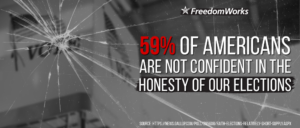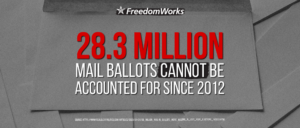FreedomWorks
The way that 2020 has gone so far (we’re less than halfway through, believe it or not), it’s easy to forget that we have fewer than 150 days remaining until our next national election.
 The stakes surrounding election security could scarcely be higher. Gallup polling continues to show that a majority of Americans polled lacked faith in the integrity of our electoral processes. Especially as we navigate through a period of economic and social upheaval, further threats to the core of our democratic republic – the right to vote and have that vote counted faithfully – could be catastrophic.
The stakes surrounding election security could scarcely be higher. Gallup polling continues to show that a majority of Americans polled lacked faith in the integrity of our electoral processes. Especially as we navigate through a period of economic and social upheaval, further threats to the core of our democratic republic – the right to vote and have that vote counted faithfully – could be catastrophic.
And yet there continue to be efforts at both the state and federal levels to implement election practices that have proven to be subject to fraud.
The latest threat, of course, has been Congressional Democrats’ attempts to establish universal mail-in ballots ahead of this November’s elections, leveraging the threat of a COVID-19 resurgence in the fall. First off, using the pandemic as an excuse for this terrible idea is a straw man. Any citizen who has gone to the grocery store (or to a protest, for that matter) during these last few months can go to the polls. For those who are more vulnerable and don’t feel safe going, a large number of states have already expanded absentee ballot eligibility to allow them to apply to vote by mail.
Some of the absentee ballot waivers at the state level have been problematic too (such as waiving the need for a witness to sign the application, in states like Virginia). Still, it requires some verification that can be traced back to the voter, as opposed to just mailing an actual ballot to whatever address the state governments have on file. Legitimate voters’ mail-in ballots can be harvested from mailboxes, and many ballots will be sent on behalf of dead, fictitious, or ineligible voters who are on the rolls. Just by way of example, FreedomWorks Vice President Parissa Sedghi received her latest primary ballot by mail – and one for the previous owner of her house as well.
Moreover, there’s no guarantee that the ballots will get to where they can be counted, which is a huge problem already with existing, opt-in, mail-in ballot programs. A study by the federal Election Assistance Commission found that, just in the four elections since 2012, over 28 million mail ballots cannot be accounted for. Perhaps they were never delivered, or maybe the recipients got lazy and failed to send them back, or perhaps they were filled out and sent and never made it to their destination.
The fact that we don’t know what happened to those millions of ballots is alarming, to say the least. Now, apply that same process to every person on the voter rolls. Just take a look at the chaos in delivering the coronavirus stimulus checks (and that wasn’t even to everyone) and apply that to ballots.
 Mail-in ballots are hardly our only concern. In spite of widespread concerns about cybersecurity, some states and localities have experimented in voting via the internet. Data and identity theft are already rampant online – now imagine hackers stealing your vote instead of your credit card. The same nefarious actors – both foreign and domestic – who enjoy sowing discord via social media ads and bots would relish the opportunity to create further doubt in our elections by messing with online voting.
Mail-in ballots are hardly our only concern. In spite of widespread concerns about cybersecurity, some states and localities have experimented in voting via the internet. Data and identity theft are already rampant online – now imagine hackers stealing your vote instead of your credit card. The same nefarious actors – both foreign and domestic – who enjoy sowing discord via social media ads and bots would relish the opportunity to create further doubt in our elections by messing with online voting.
A 2018 study by the National Academies of Sciences, Engineering, and Medicine sounded the alarm as directly as possible: “No known technology can guarantee the secrecy, security, and verifiability of a marked ballot transmitted over the internet.” The adoption of online voting must be halted at once.
Similarly, fancy, expensive digital voting machines, even if isolated from the internet, can be glitchy and can be hacked. There are times when expensive new technologies are not an improvement; paper ballots, filled out as much as possible by people coming to the polls in person, are still the gold standard.
This is not to say that physical ballots filled out in person cannot be misplaced, miscounted, and fraudulently filed – of course they can. But, there are fewer middlemen, and there is a far greater ability to audit the process, when voters have to show up, prove their identity, and vote.
Now, more than ever, we need the ability to point to our election results and unite in agreement that, even if we didn’t like the outcome of the election, we understand it was fairly won by processes we can all truly believe are impartial and fair. If we can’t do that, our republic is truly in danger.
 FreedomWorks is sponsoring a panel at FreedomFest, “the world’s largest gathering of free minds” and the first large conference to resume in person after the pandemic, entitled “Election Integrity: Securing the Sanctity of the Ballot Box.” They will be joined by John Fund, the co-author of Who’s Counting? – How Fraudsters and Bureaucrats Put Your Vote at Risk. FreedomFest will meet at Caesars Palace Las Vegas July 13-16.
FreedomWorks is sponsoring a panel at FreedomFest, “the world’s largest gathering of free minds” and the first large conference to resume in person after the pandemic, entitled “Election Integrity: Securing the Sanctity of the Ballot Box.” They will be joined by John Fund, the co-author of Who’s Counting? – How Fraudsters and Bureaucrats Put Your Vote at Risk. FreedomFest will meet at Caesars Palace Las Vegas July 13-16.

